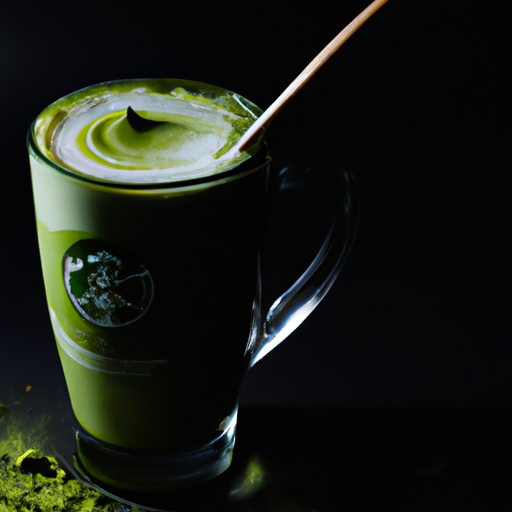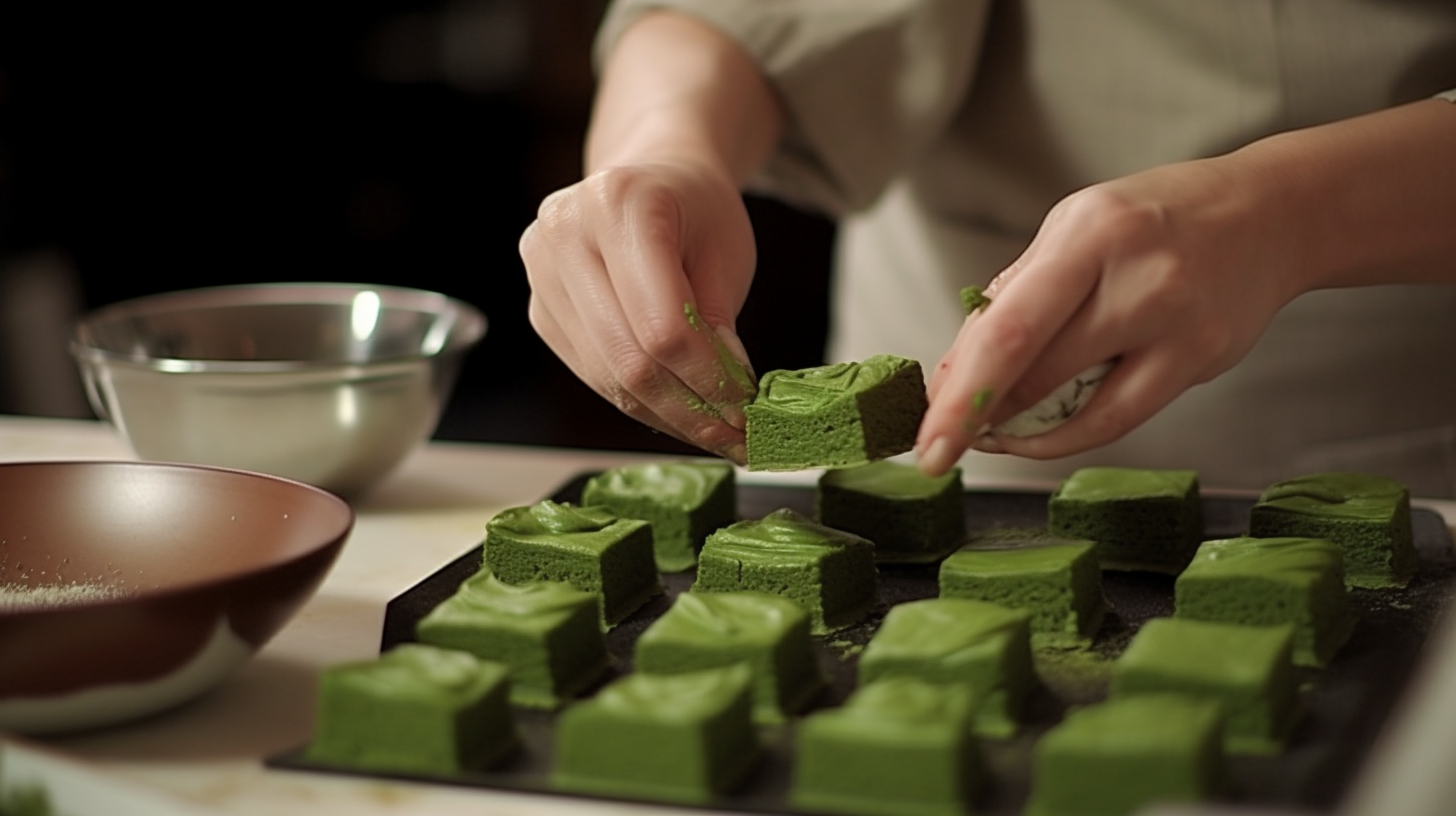As an individual who has faced challenges with losing weight, I am constantly searching for natural and healthy methods to reach my objectives. This is the reason I became fascinated upon learning about matcha and the possible advantages it may have for weight loss.
Matcha is a type of green tea that has been used in traditional Japanese ceremonies for centuries. Unlike regular green tea, matcha is made from ground whole leaves, which gives it a more concentrated dose of nutrients and antioxidants.
But what exactly makes matcha so effective for weight loss? In this article, we’ll explore the science behind matcha’s metabolism-boosting properties, as well as its ability to reduce stress and suppress appetite. We’ll also compare it to traditional weight loss supplements and provide tips on how to incorporate it into your diet.
So if you’re looking for a natural way to shed those extra pounds, keep reading!
Key Takeaways
- Matcha contains a high concentration of nutrients and antioxidants, including catechins, which have fat-burning properties and can help prevent chronic diseases like heart disease and cancer.
- Drinking matcha can increase thermogenesis, leading to an increase in energy expenditure and fat oxidation, making it an effective tool for weight loss and breaking through weight loss plateaus.
- Matcha’s calming properties, thanks to the amino acid L-theanine, can help regulate cortisol levels, reduce cravings for unhealthy foods, and promote appetite suppression.
- While matcha can be a helpful addition to a healthy lifestyle, it’s important to consume it in moderation and follow dosage recommendations to avoid potential negative side effects like insomnia and stomach upset.
What is Matcha?
You may have heard of matcha, the trendy green tea powder that’s packed with antioxidants and caffeine. Matcha is a type of Japanese green tea that has been used for centuries in traditional tea ceremonies. The history and cultivation of matcha goes back almost a thousand years, when Buddhist monks brought it over from China to Japan.
In Japan, matcha is grown in shaded areas to enhance its flavor and texture. After harvesting, the leaves are steamed, dried, and ground into a fine powder. This process preserves the nutrients found in the leaves such as antioxidants, amino acids, and vitamins.
Matcha is not only used for drinking but also in cooking due to its unique flavor profile. You can find many culinary uses for matcha like desserts, smoothies, or even savory dishes.
Matcha has gained popularity among those looking for healthier alternatives to coffee or energy drinks due to its high caffeine content. However, it’s not just about the caffeine; studies show that matcha contains a special class of antioxidants called catechins which are believed to have fat-burning properties.
With all these nutritional benefits packed into one little green powder, it’s no wonder why matcha has become so popular among health enthusiasts. Transitioning into the subsequent section about ‘the nutritional benefits of matcha’, we’ll explore how consuming this superfood can help you lose weight while providing other health benefits at the same time.
The Nutritional Benefits of Matcha
By incorporating matcha into your diet, you’ll be getting a boost of antioxidants, vitamins, and minerals that can improve overall health and wellbeing. Matcha is made from finely ground green tea leaves, which means it contains high levels of catechins and polyphenols. These are natural antioxidants that help to protect the body against damage caused by free radicals.
In fact, one cup of matcha has more antioxidants than any other type of green tea. Matcha also contains nutrients like vitamin C, selenium, chromium, zinc, and magnesium – all essential for maintaining good health. These nutrients work together to support healthy bodily functions such as digestion, immune system function, and bone strength.
Incorporating matcha into your daily routine may even help prevent chronic diseases like heart disease and cancer. Aside from its nutritional benefits when consumed internally, matcha can also be used topically as part of a skincare regimen. The same antioxidants found in matcha that protect the body against free radical damage can also benefit the skin when applied directly to it.
Additionally, there are many delicious recipes that incorporate matcha – from smoothies to baked goods – making it an easy addition to any meal plan or snack time. By nourishing our bodies with this superfood ingredient, we not only get the nutritional benefits but also enjoy its versatility in various forms.
Incorporating matcha into your diet can provide many nutritional benefits for overall health and wellness while enjoying its versatility in skincare routines or recipes. However, beyond these benefits lies another exciting aspect – the metabolism-boosting properties inherent in consuming this superfood on a regular basis – which we will dive deeper into next!
Metabolism Boosting Properties
I’m excited to share with you about the metabolism boosting properties of matcha. Matcha can increase thermogenesis, which is the process of producing heat in the body by burning calories. It also promotes fat oxidation, which means your body is better able to break down and use stored fat as an energy source.
Additionally, matcha has been shown to increase energy expenditure, meaning you burn more calories even when at rest. These benefits make matcha a great addition to any weight loss or healthy lifestyle plan.
Thermogenesis
Feeling chilly? Don’t worry, sipping on a cup of matcha can help increase your body’s thermogenesis and boost calorie burning.
Thermogenesis is the process by which our bodies produce heat and burn calories. There are two types of thermogenesis: exercise-induced and diet-induced.
Matcha has been shown to increase diet-induced thermogenesis, meaning that it increases the number of calories burned during digestion. Studies have found that drinking matcha can lead to an increase in energy expenditure and fat oxidation, making it an effective tool for weight loss.
So, not only does matcha give you a natural energy boost without the jitters or crash associated with coffee, but it also helps rev up your metabolism to burn more calories throughout the day.
Incorporating matcha into your daily routine may be just what you need to kickstart your weight loss journey. But there’s more to the story – next we’ll explore how matcha promotes fat oxidation and its role in weight management.
Fat Oxidation
Increasing fat oxidation is a key component of weight loss, and studies have found that regularly consuming matcha can lead to a significant increase in the body’s ability to burn fat for energy. Matcha contains high levels of catechins, which are antioxidants that have been shown to promote fat burning.
In fact, one study found that individuals who consumed matcha on a regular basis experienced greater rates of fat oxidation during exercise compared to those who did not consume matcha. Additionally, matcha can help break through weight loss plateaus by increasing the body’s metabolic rate.
When we lose weight, our metabolism slows down as our body adjusts to its new size and composition. However, the catechins in matcha have been shown to increase thermogenesis and stimulate the breakdown of stored fats for energy. This means that by incorporating matcha into your diet and exercise routine, you may be able to push past stubborn weight loss plateaus and continue seeing results.
With increased fat burning capabilities from consuming matcha, next we will explore how it also influences increased energy expenditure.
Increased Energy Expenditure
By boosting the body’s metabolism and thermogenesis, matcha can lead to a significant increase in energy expenditure. This means that consuming matcha can help you burn more calories throughout the day, even when you’re not exercising.
In fact, studies have shown that drinking matcha can increase energy expenditure by up to 8-10%. To maximize the weight loss benefits of matcha, it’s important to pay attention to meal timing and hydration.
Drinking matcha before a workout or as part of your breakfast can help boost your metabolism and provide sustained energy throughout the day. Additionally, staying hydrated is crucial for optimal weight loss, as dehydration can slow down your metabolism and make it harder for your body to burn fat.
Incorporating matcha into your daily routine along with healthy eating habits and proper hydration can be an effective strategy for losing weight.
As we move on to discuss stress reduction and cortisol levels, it’s important to note that reducing stress is also crucial for weight loss success.
Stress Reduction and Cortisol Levels
When you’re stressed, your body releases cortisol which can lead to weight gain, but matcha’s calming properties can help regulate those levels and promote weight loss.
Cortisol is a hormone that helps the body respond to stress. However, when cortisol levels are chronically elevated due to chronic stress, it can lead to an increase in appetite, particularly for high-fat and high-sugar foods. This is because cortisol signals the body to replenish its energy stores after experiencing stress.
Matcha contains L-theanine, an amino acid that promotes relaxation without causing drowsiness. When combined with caffeine, which is also found in matcha but at lower levels than in coffee, it creates a state of calm alertness. Studies have shown that L-theanine can reduce cortisol levels and blood pressure in response to stressors such as mental tasks or challenging situations.
By reducing cortisol levels through stress management techniques like drinking matcha tea regularly, we may be able to decrease our cravings for unhealthy foods and help regulate our appetite.
In addition to this benefit of reducing food intake due to reduced cravings for unhealthy foods, there is also evidence suggesting that matcha has compounds that actively suppress hunger hormones such as ghrelin and leptin. With both these effects combined- reduced cravings plus suppressed hunger hormones- one’s daily caloric intake naturally decreases resulting in an overall reduction of weight over time without any drastic changes or interventions needed!
Appetite Suppression
Suppressing hunger hormones is a key factor in naturally reducing caloric intake and achieving weight loss goals, making appetite suppression an important benefit of incorporating matcha into your daily routine. Matcha contains catechins, which are natural compounds that have been found to reduce ghrelin levels, a hormone that stimulates appetite. By lowering ghrelin levels, matcha can help you feel fuller for longer periods of time and prevent overeating.
In addition to suppressing hunger hormones, meal timing and mindful eating can also play a role in weight management. It’s important to eat regular meals throughout the day and not skip meals or snacks. Skipping meals can lead to overeating later on due to extreme hunger. Mindful eating involves being present and aware while eating, paying attention to internal hunger cues and stopping when full. Incorporating matcha into your diet can help with both meal timing and mindful eating by providing a satisfying beverage option between meals.
Overall, incorporating matcha into your daily routine for appetite suppression along with proper meal timing and mindful eating habits can be effective strategies for weight loss. In the next section, we will explore how matcha can enhance exercise performance and further support weight loss goals without relying solely on calorie restriction.
Matcha and Exercise
Incorporating matcha into your daily routine can enhance exercise performance and support weight loss goals through its natural benefits. Matcha contains caffeine, which is known to improve physical performance during exercise by increasing energy levels and reducing fatigue.
Additionally, matcha contains an amino acid called L-theanine, which promotes relaxation without causing drowsiness. This combination of caffeine and L-theanine can provide a calm yet energized state that may help individuals perform better during workouts.
Matcha also has the potential to improve endurance during exercise. A study published in the American Journal of Physiology found that consuming green tea extract, which includes matcha, for 10 weeks improved cycling endurance in male participants.
This improvement was attributed to the catechins found in green tea, which are potent antioxidants that have been shown to increase fat oxidation during exercise.
Whether it’s yoga or high intensity interval training (HIIT), incorporating matcha into your pre-workout routine could potentially enhance your performance and contribute to weight loss efforts. However, it’s important to remember that while matcha has many health benefits, it shouldn’t be relied on as the sole method for weight loss.
In the next section, we’ll explore how matcha compares to traditional weight loss supplements.
Matcha vs. Traditional Weight Loss Supplements
Comparing matcha to traditional weight loss supplements reveals the potential benefits of incorporating a natural, antioxidant-rich option into one’s weight loss journey. Unlike many weight loss pills that contain stimulants and other chemicals, matcha is derived from pure green tea leaves. This means that it’s generally considered safe to consume and may have fewer negative side effects than some traditional supplements.
In terms of long term effectiveness, research has shown that matcha may be able to help with weight management by increasing metabolism and assisting in fat oxidation. Additionally, its high concentration of catechins – a type of antioxidant – may help reduce inflammation and improve overall health. However, it’s important to note that while matcha can be a helpful addition to a healthy lifestyle, it isn’t a magic solution for weight loss on its own.
To incorporate matcha into your diet, try swapping out your morning coffee for a cup of matcha green tea instead. You can also add matcha powder to smoothies or use it in baking recipes as an alternative to regular flour.
As with any supplement or dietary change, it’s always best to consult with a healthcare professional before making significant changes to your routine.
How to Incorporate Matcha into Your Diet
Are you looking to add a pop of green goodness to your diet? Why not sprinkle some matcha magic into your meals and drinks like fairy dust, infusing them with the powerful benefits of antioxidants and metabolism-boosting properties.
Matcha can be easily incorporated into your daily routine by trying out some delicious matcha recipes or participating in traditional Japanese matcha tea ceremonies. One simple way to incorporate matcha is by adding it to smoothies or oatmeal bowls. You can also try making matcha lattes with almond milk for a tasty and healthy alternative to coffee.
For a more traditional approach, join a local tea ceremony group where you can learn about the history and cultural significance of matcha while enjoying its health benefits. It’s important to note that although matcha has numerous health benefits, consuming too much may lead to potential side effects such as insomnia or stomach upset. As with any dietary change, it’s best to start small and gradually increase intake while monitoring how your body responds.
Potential Side Effects
It’s important to be mindful of the potential side effects of consuming too much matcha. While it has many health benefits, consuming excessive amounts can lead to negative effects such as insomnia and stomach upset.
Matcha contains caffeine, which can cause sleep disturbances if consumed in large quantities. Additionally, matcha is high in tannins which can cause stomach irritation when consumed in excess.
To avoid these side effects, it’s essential to follow dosage recommendations when incorporating matcha into your diet. It’s recommended to consume no more than 2-3 cups of matcha per day, or up to 400mg of caffeine daily from all sources.
It’s also important not to consume it on an empty stomach as this may increase the risk of gastrointestinal issues. If you experience any adverse effects after consuming matcha, reduce your intake or stop consumption altogether.
While matcha has many health benefits and can aid in weight loss efforts, it’s crucial to be aware of its potential side effects and follow dosage recommendations accordingly. By doing so, you can reap the numerous benefits that this superfood offers without experiencing any negative consequences.
Frequently Asked Questions
How many cups of matcha should I drink per day to see weight loss results?
To maximize matcha’s weight loss benefits, it’s important to practice portion control and stay hydrated. As for how many cups of matcha you should drink per day to see weight loss results, it really depends on your individual needs and goals.
However, it’s generally recommended to limit your intake to two or three cups per day as too much caffeine can have negative effects on the body. It’s also important to note that while matcha has been shown to boost metabolism and aid in weight loss, it should not be relied upon as a sole solution for shedding pounds.
Incorporating regular exercise and a healthy diet are still key factors in achieving sustainable weight loss results.
Can matcha be consumed in other forms besides a hot drink?
When it comes to consuming matcha, there are plenty of options beyond just a hot drink. Matcha powder can be used in various recipes, including smoothies, baked goods, and even savory dishes like stir-fry or salad dressing.
If you are unable to find matcha powder at your local store or online, there are substitutes available, such as green tea powder or spirulina powder, which also offer similar health benefits.
Incorporating matcha into your diet through these alternate forms can help increase your daily consumption and potentially aid in weight loss efforts.
Is it safe for pregnant women to consume matcha for weight loss?
Matcha consumption during pregnancy should be approached with caution in terms of pregnancy safety. While matcha does have potential weight loss benefits, it’s important to consider the potential risks associated with caffeine intake during pregnancy.
It’s recommended that pregnant women limit their caffeine intake to no more than 200mg per day. The amount of caffeine in matcha can vary depending on the concentration and serving size, so it’s best to consult with a healthcare provider before consuming matcha for weight loss purposes during pregnancy or while breastfeeding.
Overall, prioritizing a healthy and balanced diet and regular exercise may be safer and more effective for managing weight during this time.
Does matcha have any impact on cholesterol levels?
I’ve found that matcha can potentially play a role in metabolism and may even help to lower cholesterol levels. Studies have shown that the catechins present in matcha can increase fat oxidation and thermogenesis, which could contribute to weight loss.
However, it’s important to note that excessive consumption of matcha can lead to potential side effects such as caffeine sensitivity or digestive issues. Therefore, while incorporating matcha into a balanced diet may be beneficial for overall health and weight management, it’s important to consume it in moderation and consult with a healthcare professional if any concerns arise.
Is there a specific time of day that is best to drink matcha for weight loss?
When it comes to weight loss, the timing of when you consume matcha can make a difference. Studies have shown that drinking matcha in the morning may help increase metabolism and burn more calories throughout the day. However, consuming matcha in the evening may interfere with sleep due to its caffeine content.
Matcha latte or smoothie are delicious options for those who prefer a creamier texture, but they often contain added sugars or dairy products that can hinder weight loss efforts. Using matcha tea bags or supplements is a convenient way to incorporate matcha into your diet without any extra calories or additives.
Ultimately, incorporating matcha into a balanced diet and healthy lifestyle is key for successful weight management.
Conclusion
In conclusion, incorporating matcha into your weight loss journey can be a game changer. Its metabolism-boosting properties, stress-reducing effects, and appetite suppression make it a unique addition to any healthy diet.
Plus, its high nutritional value means you’re fueling your body with essential vitamins and minerals while shedding pounds.
As the saying goes, ‘matcha made in heaven’ couldn’t be more fitting when it comes to this potent green tea powder. So why not give it a try and see for yourself how matcha can help you reach your weight loss goals?
Just remember to always consult with your healthcare provider before adding any new supplement or food into your diet.










